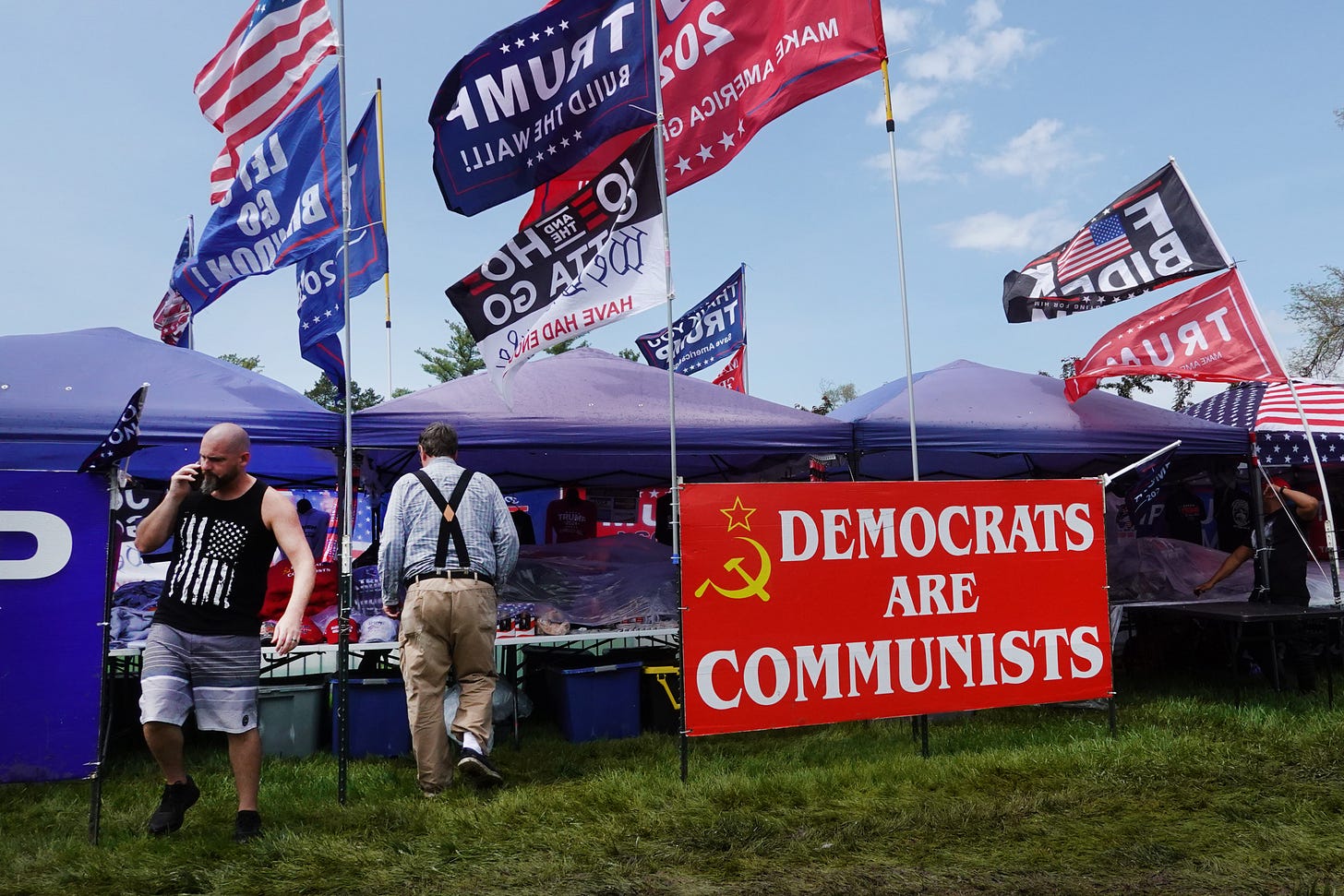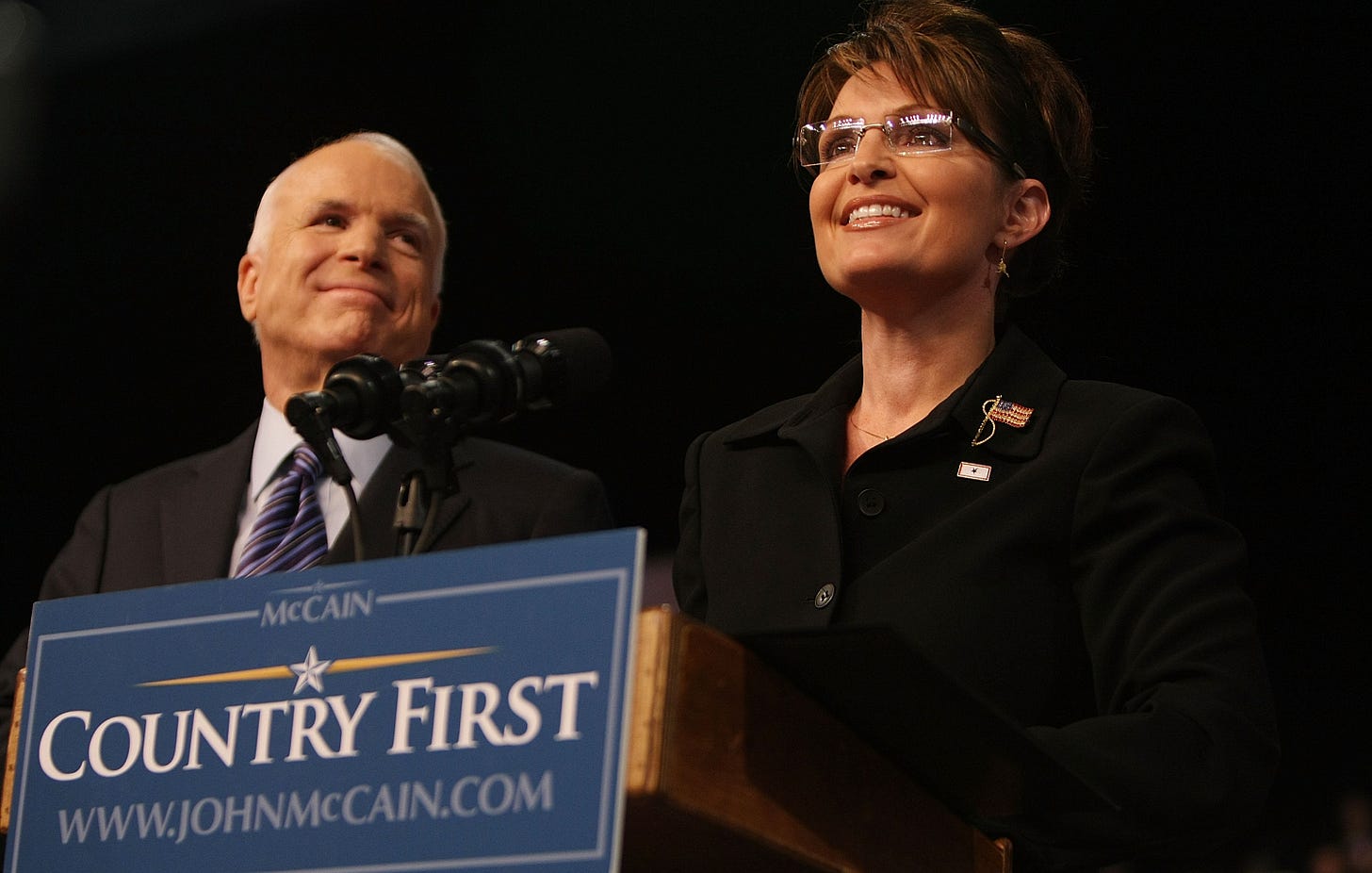How Trump still taps into America's cultural animus
He's uniquely dangerous. But he's also a product of forces that will outlast him.
This entirely free edition of Public Notice is made possible by paid subscribers. If you appreciate our work and aren’t already one, please support us by signing up. Just click the button below for a free trial.
Following the fourth wave of indictments of former President Donald J. Trump on August 15, most commentary has addressed the legal details of the accusations, speculated on likely legal tactics, and explored the political consequences of a trial during an election year.
What has been missing is a discussion of why so many otherwise “reasonable” people continue to embrace an anti-democratic and authoritarian leader so much so that recent polls show Trump and President Joe Biden effectively tied.
Dismissing Trump supporters as “deplorables” or as nut cases misses the point. The Democratic Party in particular, and liberalism in general, seriously underestimate the emotional and affective dimensions of right-wing authoritarianism in America.
RELATED FROM PN: Republicans like DeSantis’s hate. They just don't like him.
It’s probably too late to try to convince most Trump supporters to abandon their willingness to endorse openly fascist, racist, science-denying policies. Instead, we need to understand what’s behind their support and how those on the margins — still leaning, but perhaps not quite in either camp — could be persuaded to embrace a more inclusive set of policies that honor the country’s diversity, address major public issues like the climate crisis, and exert leadership relative to a host of foreign policy challenges.
Transgression is at the core Trumpism
When Trump first won the presidency in 2016, legacy media outlets, including the New York Times, wrung their hands in anguish for having missed the story of profound public anxiety about the future. They raced to diners and truck stops across the Midwest in an effort to find out what “ordinary Americans” — those who rejected the Roosevelt coalition and bicoastal liberalism — were thinking and feeling.
The stories that resulted painted a picture of the American Dream in a considerable state of decay, if not outright shambles. To anyone familiar with those areas, this was less a revelation than a confirmation that the myth of the hard-working family building a better future in the land of opportunity was just that. The deep residues of racism from the Civil War and its aftermath in the Jim Crow South were just the most flammable components of a promise gone awry, thanks to persistent ethnocentrism and racism, the enduring power of class stratification, and the ability of the wealthiest to game the system for advantage in taxes, regulatory neglect, and evasion of legal accountability.
Trump’s success as a demagogue was to give voice to growing frustration in a way that had never been done publicly before. Until he came along on the national stage, the anger, resentment, and entitlement of lawless transgression was always present, but relegated to the margins of mainstream politics.
Of course, this is a contestable point. Anyone who has studied the KKK, or Father Coughlin, or lynchings in the deep South, the Tulsa massacre of 1920 or sundown laws in the North would know that overt racism was always deeply embedded in both political parties. But by the 1960s the most extreme manifestations were fighting uphill battles against the Civil Rights movement and a succession of Supreme Court decisions made during Earl Warren’s tenure as chief justice.
Still, the underlying rage of white supremacists and others allied with the right, or the so-called “conservative” wing, never went away. The Nixon administration harnessed that anger and resentment into an electoral strategy, with its appeals to a “Silent Majority” and a “Southern Strategy” that sought to loosen the hold of the Democratic Party on the South by becoming more overtly allied with the forces of “law and order.”
A note from Aaron: Working with brilliant contributors like Scott and Bradley requires resources. To support this work, please click the button below and take advantage of my special offer — free trials for all new signups.
The Reagan administration continued the rhetoric of obfuscation even as the republic’s condition as a land of opportunity tilted toward the affluent deepened. Everything was wrapped in a strange combination of vapid avuncularity and film-trailer profundity: “morning in America,” “a bear in the woods, “tear down this wall,” “just say no,” “evil empire.” Reagan’s message seemed an innocent product of small-town Americana — even as his administration dismantled the social programs so desperately needed by the rural and urban poor and further militarized urban policy through the War on Drugs.
This whole Republican effort has, over the years, been geared towards masking the malignancy of its message. In the 2008 presidential campaign the party discovered that large sections of the public would eagerly consume messages of fear. In a sop to the extreme right-wing, the GOP hauled Alaska Gov. Sarah Palin from obscurity to within five points of becoming the country’s vice president. Barack Obama’s candidacy, and his two-term presidency, obscured the extent to which Palin’s openly deranged campaign actually came to represent a strong contingent of the Republican base — one that the party’s lead candidate, John McCain, understood all too well, though much to his later regret.
Trump’s approach has been to take this many steps further, stripping off all pretense of niceties and revealing the underlying animus toward immigrants and people of color, as well as toward those in power. He made this clear at the outset in June 2015 when he declared his candidacy by attacking immigrants — notably those crossing the Mexican/US border — as the embodiment of a criminal presence in our midst. Since then, it’s been a steady stream of the kind of invective that would previously have brought a candidate to ruin — attacks on the physically disabled, on veterans, on prisoners of war and even the war dead. His “American carnage” inauguration speech turned “a city on the hill” into a city in ruins.
RELATED FROM PN: Nikki Haley and the politics of faux-moderation
For all the attention focused on Trump’s proclivity for transgressive speech, what needs to be appreciated is the reason he gets away with it. At some level that commentators prefer to overlook, the message resonates with a percentage of the population who view themselves as existing in a state of precarity and impending doom. It’s not just counties with high rates of meth usage where the message of decay and despair strikes a responsive chord. Trump’s appeal to suburban white women, the professional class, and the working class in much of the country represents a resilient feature of this “dance with the devil” approach to the new politics of public life.
Trump‘s approach to rhetoric and politics might best be explained as cast in a spirit that’s the exact opposite of a comedian. He’s a doomsayer, a catastrophizer, someone who’s perfectly comfortable expressing an approach to ethics and everyday life that proudly proclaims its persistent transgressive quality, abjectly criminal and openly flaunting any veneer of public ethics. When reprimanded by a judge not to threaten or malign potential witnesses, he immediately goes to social media to promise retaliation. When caught on tape demeaning women, he does not apologize or backtrack, but deepens the transgression by claiming a celebrity’s right to assault women. In refusing to visit the scene of an historic battle where thousands lost their lives, he dismisses their great sacrifice as a case of honoring losers.
The cruelty is a feature, not a bug
Trump’s rhetoric has a double function. At one level he shows that he — and he alone — can sail above conventional propriety and be openly racist, homophobic, misogynist, and unaccountable, and thus an anti-politician. This helps him sidestep the normal measures of political legitimation. And when media pundits and his partisan supporters effectively endorse this stratagem through a view that it’s just “Trump being Trump,” the path is cleared for knocking down the guardrails of democratic society.
The second function is the more insidious one, though hard to verify empirically. This is where demonstrating unchecked venality and cruelty resonates with an audience which, in various ways, itself feels excluded, scared, and on the edge. It’s an audience that’s also disgusted with the status quo and feels relief that someone so prominent can not only also voice their own frustrations so publicly, but can convince them of the possibility of succeeding against the odds. In effect, Trump says “See what they try to do to me and see how I remain rich, powerful and adored? Come with me and you will share my triumph.” This is the message of a cult leader who promises a new and select community-in-the-making.
Political psychologists and sociologists have been studying a version of this latent “authoritarian personality” (T.W. Adorno, et al, 1950) for decades now. It has to do with the burdens of citizenship in a putative democracy where people feel acutely the strains of day-to-day life and find they are not up to the task of civic engagement. But the early studies of democratic authoritarianism focused too much on submissiveness and not enough on the active engagement that helps animate a fascist movement.
What Trump has done is sanction lawlessness and criminal transgression as an everyday part of governance. What’s different about Trumpism is the way he lets vast numbers of a disgruntled populace know that it’s okay to offend, to attack, to break the law, to evade the regulatory culture required to sustain political and economic life. The psychological ease he affords those feeling vulnerable is extremely powerful. Put simply, it amounts to community building for those who have felt excluded.
These people don’t need to mask or get vaccinated to be safe. They don’t have to pay their taxes. They don't have to alter their lifestyle to fight climate change. They don’t have to tolerate LGBTQ communities. They don’t have to monitor their language for fear of offending people. They don’t have to rely upon law enforcement officers if they can arm themselves in defense of the invading horde.
The catch here is that in giving license to their transgressive selves, they miss what’s happening behind the scenes — the GOP’s wholesale dismantling of New Deal policies and agencies that created the middle class whose disappearance they now mourn. Whether it was Social Security, the Warren Court’s guarantees of basic rights, the EPA, the Department of Education — the GOP has managed to convince vast segments of the American populace that the very agencies and policies that were designed to protect them are in fact the problem.
A whole panoply of well-funded (and heavily-funding) institutions have been working on behalf of this deregulatory message for decades. Everyone from the NRA and Federalist Society to extractive industry (oil, gas, coal) and many white evangelical churches have been jockeying for position and organizing subterraneously for years in trying to deconstruct the modern welfare state. Now that they have found their candidate in Trump — a leader who’s uniquely capable of seducing the public into a politics of self-assertion and certitude — they are also able to target those laws, rulings, and precedents that had been at the core of liberal democracy since the 1960s. If along the way they have to accept someone as unsettling as Trump to get the job done, that’s done with relief and gratitude; they finally found someone outrageous and uncensored enough to articulate their deepest wishes.
RELATED FROM PN: Republicans love RFK Jr. because his conspiracies are theirs
Trump’s rhetoric has provided an illusion of personal freedom and transgression that is strangely and dangerously liberating — for men, anyway, for whom it countenances a virile, highly charged masculine presence that includes the ability to rule women’s bodies.
Until his indictments, that rhetoric was, in essence, without consequence or accountability. Now, finally, Trump is being held to account for his long-running criminality. It just might be enough this time to dislodge him from power. But if we don’t take that underlying cultural animus seriously, it won't be long before someone else emerges and picks up on the temptation to exploit that deep-seated sense of unease that has been seething just below the surface in America for decades.
That’s it for today
Aaron is taking a couple weeks off from the podcast, but we’ll be back with a fresh newsletter on Friday.
Finally, you enjoy this (free) post and aren’t already signed up for Public Notice, click the button above to get each new edition of the newsletter right in your inbox. And to support this work and get full access to the site, consider becoming a paid subscriber.









This is one of the most cogent analyses of Trumpism and it’s adherents that I’ve ever seen. Thanks guys. I’ll repost on my newsletter Freedom Over Fascism. Please take a look over there, particularly at the podcast!
Trump is the last grasp of white people (btw, its the WHITE working class he appeals to not the working class. Much like Dems win the women's vote but lose WHITE women) who don't want to share. That's what this whole problem boils down to. However, whatever battles these people win, they've already lost the war. Whites under 18 already became a minority in 2020. By 2027 the majority of 18-29 year olds will be non white etc etc so on and so forth. So, yes, while Trumpism will still be with us and even pick up a few nonwhite faces (mainly dudes) in the coming years its already dead as a political force.